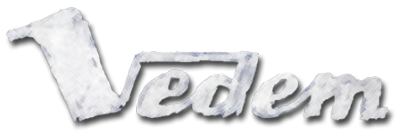 BLOCK E IV - THE VRCHLABÍ BARRACKS
BLOCK E IV - THE VRCHLABÍ BARRACKS
The ''Vrchlabí (Hohenelbe) Barracks'', orignially a military hospital, served as the Central Hospital also in Ghetto times. It was used also as the central bath with showers and a swimming pool. The kitchen here prepared food for the sick.

THE PSYSICIAN AND TEREZÍN
One of the most dedicated workers in Terezín is he who battles with death - the Physician. The doctor of Terezín surely has a task more responsible than any other doctor in the world. Day after day his hands touch people, whether during the many operations he must perform, at a delivery, or during a blood transfusion. Naturally the doctor's work has been made easier since many essential medical aids have arrived in the ghetto, such as injections, equipment for the operating theater, etc. But what was it like, say, two years ago?
I used to know one of the physicians (presently in Poland), Dr. E Mladý, a man of great temperament, strong, ambitious, with about four years of practice behind him. He came with four hundred other men in the AK transport. One day one of the men who were sharing a room with him complained of sharp pains on the right side of his abdomen. The doctor waited a day and because the pain did not let up, he diagnosed appendicitis. But how was he to operate? There was no operating room, no reliable sterilizing medium, no recovery room. But he convinced himself the operation would work, and next morning he proceeded. Three days and three nights the patient hovered between life and death, tossing and turning with a high fever. For three days the doctor did not leave his bedside (it hardly deserved this name), nursing his patient as if he were his own child. He scarcely ate, washed, or slept. On the fourth day the crisis was over and the patient, who would surely have died without the dedicated care of Dr. Mladý, slowly recovered.
Like him, the majority of doctors in Terezín, cven without essential materials, fought death without the slightest financial advantage to themselves.
- Don Herberto (Herbert Fischl)
THE GREAT FIRE IN THE VRCHLABÍ BARRACKS
At a quarter to eight on Thursday, December 9, I returned as I did every day from the Hannover barracks. When I passed the church I could hear shrill whistling coming from the Vrchlabí barracks. I followed the sound and heard the man with the whistle saying to the Ghettowachmann: "Grosses Feurer im Hannover!" (A big fire in the Hannover barracks). I translated that into Czech for my brother as we raced to the scene of the fire. The fire engine was already there, ready to pump water, but despite the efforts of our volunteer firemen, they couldn't get the engine to pump water. It took about three minutes to get the pump going and then the firemen, standing on the bunker next to the burning wall of the carpenter's shop, started to pump water through the window into the burning rooms. A strong spotlight illuminated the scene. After a little while steam and smoke began to rise so that we could not see anything. But then the Ghettowache came and cleared the area. We were forced to leave and so my report is finished.
- Paintbrush (Unknown author)
ZENTRALBAD
Having obtained a red or white ticket with the letter M or J, I take my towel, soap, and washcloth and go to Vrchlabí - the main bathhouse. There I join a group of men or boys waiting for the gates to open. If the group consists of men I listen to the latest guaranteed accurate news, and if they are boys, I get up-to-date reports on the Terezín sports scene, or on girls, or suchlike. Snddenly the gates open, the group starts to move and I with them. A man appears who wants to see my tícket, checks ít and then lets n-.e in with the words: "Get your clogs and get moving!" I take a few steps, then a boy stops me and directs me to a room. When I enter, I see a number of benches and pegs. I take off my clothes because there are only people of my sex here and there's no reason to be bashful. Then I go to a man who examines my hair and body before letting me go under the shower. Later I heard hím referred to as the delouser, or something like that. When I tried to find out more about him I was told that he was an elderly physician who no longer practiced and who worked in the Gesundheitswesen department. If I'm one of the last there's no free shower any more I'm at the mercy of my companions. The Zentralbad has two shower rooms and one pool where people are rarely allowed in. In each room a boy turns on the water: this is done twice at seven-minute intervals. In between you have to soap yourself down. When the bath is over cold water is let in, but only a few brave souls can stand under it. Some of the boys always go for their bath in the evening because sometimes, if they're lucky, they can get into the pool even without a ticket. Since I don't know what else to write, I am finishing my commentary.
- Medic Šnajer (Jiří Grúnbaum)
PHOTOS BLOK E VI - THE VRCHLABÍ BARRACKS
The list of objects
- 1 - Ghetto museum
- 2 - Terezín town hall
- 3 - Z 414
- 4 - L 410
- 5 - Marktplatz
- 6 - L 415
- 7 - Q 418
- 8 - Seat of the SS kommandatur
- 9 - Engineer barracks
- 10 - Seat of the ghetto guard
- 11 - L 318
- 12 - Block F III
- 13 - Seat of czech gendarmes
- 14 - Block H II
- 15 - L 324
- 16 - The Podmokly barracks
- 17 - The Ústí barracks
- 18 - The Dresden barracks19 - G VI
- 20 - Stadtpark
- 21 - The Vrchlabí barracks
- 22 - The Kavalier barracks
- 23 - Former brawery
- 24 - Badhauusgasse 21
- 25 - The Magneburg barracks
- 26 - The Hannover barracks
- 27 - Bakery
- 28 - Bahnhofstrasse
- 29 - The Hanburg barracks
- 30 - Jagerkaserne
- 31 - Southern hill
- 32 - The Sudeten barracks
- 33 - Westgasse - Sokolovna
- 34 - Central Mortuary
- 35 - The ramparts
- 36 - The cemetery with the crematorium
- 37 - Bohušovice nad Ohří
- 38 - The Bohušovice hollow
- 39 - The bulwark gardens





